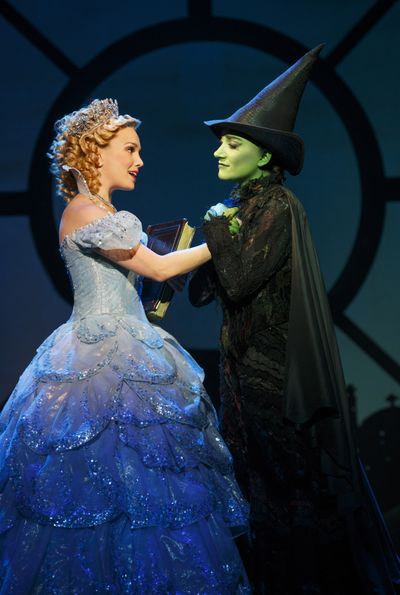Witches’ story is ‘Wicked’ good
Unexpectedly uplifting Broadway hit returns to Spokane’s INB stage

Some Broadway hits offer spectacle, as in “The Lion King.”
Some offer emotional release, as in “Phantom of the Opera.”
Some offer archetypal characters, as in “Les Misérables.”
Here’s what happens when you offer all of those things (and more) in one exceptional package: You sell 40 million tickets worldwide and gross $3.3 billion.
That’s “Wicked,” which in just over a decade has become a theatrical phenomenon to rival all of the above-mentioned shows.
“Wicked” has been the highest grossing show on Broadway for a mind-boggling nine consecutive years. Meanwhile, eight other companies are performing the show around the world, including in Seoul, Tokyo and Mexico City.
Spokane embraced the show in 2011, when about 40,000 people crowded into a 16-show run at the INB Performing Arts Center. Now the touring company of “Wicked” is back for a 24-show run and this time it will probably sweep in 60,000 more happy theatergoers.
David Stone has a unique perspective on the show’s journey, since he has been there every step of the way as one of the lead producers of “Wicked.” He remembers the moment he realized that this show might have something special. It was at the first public preview of the show in San Francisco. He was standing at the back of the house with Gregory Maguire, the author who wrote the novel, Stephen Schwartz, the composer, and Marc Platt, his fellow producer.
The audience response to the opening song was warm, yet not overly enthusiastic.
“Then the back wall opens and out runs this young, idealistic, hopeful, beautiful green girl,” said Stone, in a phone interview last week. “And the audience went crazy. We looked at each other thought, ‘Oh, God.’ “
This was not the typical “entrance applause” for a star, because at the time Idina Menzel was not yet a star. It happened, said Stone, “because this character was probably the character they were most scared of in their childhood, and she wasn’t what they thought she would be.”
“The whole idea of the show is in that moment,” said Stone. “And the audience got it. Quickly and completely.”
Months of revision still lay ahead, yet it was already evident that the story of Elphaba, Oz’s “wicked witch,” resonated in the psyches of theatergoers. That first visceral audience response has been repeated “at every performance, everywhere in the world, ever since,” said Stone.
The show opened on Broadway in the fall of 2003, to good –but not unanimously glowing – reviews. It was clearly a hit, but not a blockbuster. It was a slow-building phenomenon, created largely through word-of-mouth from deeply satisfied fans. By the summer of 2004, “Wicked” had grown into the undisputed ruler of the Broadway box office.
A decade later, it shows no signs of abating. Variety magazine recently reported that during Christmas week of 2013, “Wicked” set the all-time Broadway record for box office receipts during a single week.
Laurel Harris also has a unique perspective on the enduring power of Elphaba’s opening scene. During the show’s 2011 visit to Spokane, Harris was a member of the ensemble and watched from the wings as Elphaba made her opening entrance. This time, around, Harris will feel the audience response directly from center stage, as she makes her entrance as Elphaba.
“It’s a very moving and empowering moment for the character, and so exciting for the audience, because they’re waiting for that green girl,” said Harris, who took over the lead role about a month ago. “You know, they’ve seen Glinda – and now they want to see the green one. The way it’s staged, the lighting and the music, it all culminates in this incredibly powerful moment.”
That entrance is followed by an even more famous moment at the close of Act 1, the “Defying Gravity” number.
“It’s pretty spectacular,” said Harris, who hails from North Carolina. “… And without giving it away to people who haven’t seen the show yet, it is – how can I put it? – a very uplifting moment. And it can be a little scary.”
The strengths of “Wicked” are, in some ways, the strengths of any big Broadway hit. It has a terrific score by Schwartz, colorful costumes and an outstanding visual style – all gears, cogs and clock faces. Yet those attributes are insufficient to explain the phenomenon.
Producer Stone has put a lot of thought into what makes “Wicked” into such a soul-satisfying experience for so many people. His conclusion: It’s the power of the story itself.
“Beyond the beautiful sets and costumes, beyond the great score and wonderful staging, is a story of two women,” said Stone. “And you want to know what happens to them. You care about the characters and you care about the story.”
And that, he said, is not necessarily a strength of every hit show. For instance, “Mamma Mia” is primarily a party. “Phantom of the Opera” is primarily a romance. “Book of Mormon” is primarily a laugh-fest. The one show that come closes to “Wicked,” as pure compelling story, is “Les Misérables,” said Stone. And that, too, became an enduring international phenomenon.
“Wicked” is also set apart by one other powerful element: Its connection to a story that all Americans know by heart, “The Wizard of Oz.” “Wicked” is based on Maguire’s novel of the same name, which tells the story of the Wicked Witch of the West from her own green-tinted perspective.
Maguire, Schwartz, and scriptwriter Winnie Holzman have accomplished a remarkable feat with “Wicked.” They have convinced millions of us that the Wicked Witch we once loved to hate was much more complicated – and yes, uplifting – than we ever imagined.